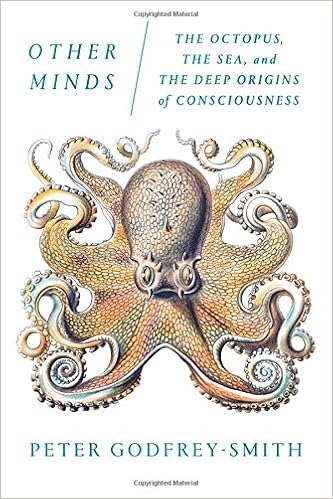This is part of the DR Book Collection.
 With philosopher Peter Godfrey-Smith’s Other Minds: The Octopus, the Sea, and the Deep Origins of Consciousness, I have learned more about cephalopods–squids, octopuses, and nautiluses–than I’ve ever cared to know. And it was deeply fascinating.
With philosopher Peter Godfrey-Smith’s Other Minds: The Octopus, the Sea, and the Deep Origins of Consciousness, I have learned more about cephalopods–squids, octopuses, and nautiluses–than I’ve ever cared to know. And it was deeply fascinating.
I have always found the ocean to be frightening and incredibly alien. The temperature and lack of oxygen in space are certainly scary, but add creatures that are weird and often predatory to the mix? No thank you. But this makes Godfrey-Smith’s exploration all the more absorbing. He weaves together philosophy, science, and personal anecdotes (he’s an avid scuba diver) in a way that causes the reader to reflect on the strangeness of life and especially the oddity of consciousness. He explains,
Cephalopods are an island of mental complexity in the sea of invertebrate animals. Because our most recent common ancestor was so simple and lies so far back, cephalopods are an independent experiment in the evolution of large brains and complex behavior. If we can make contact with cephalopods as sentient beings, it is not because of a shared history, not because of kinship, but because evolution built minds twice over. This is probably the closest we will come to meeting an intelligent alien (pg. 9).
Yet, the neurons of an octopus operate differently than those of vertebrates, spanning the creature’s entire body:
“Smart” is a contentious term to use, so let’s begin cautiously. First, these animals evolved large nervous systems, including large brains…A common octopus…has about 500 million neurons in its body…Humans have many more–something like 100 billion–but the octopus is in the same range as various smaller mammals, close to the range of dogs, and cephalopods have much larger nervous systems than all other invertebrates…When biologists look at a bird, a mammal, even a fish, they are able to map many parts of one animal’s brain onto another’s. Vertebrate brains all have a common architecture. When vertebrate brains are compared to octopus brains, all bets–or rather, all mappings–are off. There is no part-by-part correspondence between the parts of their brains and ours. Indeed, octopuses have not even collected the majority of their neurons inside their brains; most of the neurons are found in the their arms (pg. 50-51).
And that’s just getting started. These scientific and philosophical reflections go back to some of the deepest questions that have been with humanity for thousands of years:
- What is it to be alive?
- What is to be?
- What is it to be conscious?
While I would have preferred a little more philosophy (even some speculation), the book is nonetheless an eye-opening read. You can see Godfrey-Smith speaking on the subject at Google below.